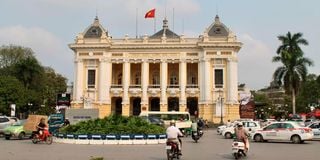Premium
Remembering war and peace in Vietnam

The Hanoi Opera House in Vietnam.
Freda, my regular taxi driver, arrived in the early morning to take me to the airport.
‘Where are you going to this time, Mr John?’
‘Vietnam.’
‘So, you are going to the war!’
Whenever I was writing about another country in Africa I had few concerns about how relevant my article would be — relevant for Kenyan readers. Kenyans seem to have a strong interest in what is happening elsewhere in Africa, particularly in countries such as South Africa or our neighbours Uganda or Somalia.
However, writing from beyond this continent, finding relevance can be a key challenge. I was soon to realise that, on that occasion, Freda had given me a possible opening. This was confirmed a few day later when I saw that the country’s English language paper had a lead article on Vietnam as one of the most secure tourist destinations in the world. There, then, was the story: that Vietnam was still being perceived as a country of war but, in fact, it deserved having a growing number of tourists enjoying its peace.
Six assignments
I must have had five or six assignments in Vietnam and I have grown to respect and appreciate its people. They are a gracious and industrious. They are proud, and they have good reason to be. In the museum of modern history in Hanoi, there is a huge map spread across a wall. Vietnam is, of course, at its centre. There are three confidently drawn arrows showing how, first and after many years, they had repulsed the Chinese, then the French colonists, and finally the Americans.
Ho Chi Minh once said in the middle of what they call the American War that even if the Vietcong killed one American for every 20 they themselves lost, they would still win the war. And they did.
I like Hanoi, the northern capital. At its centre is a lake. There are tea shops and restaurants on its shores. People used to assemble by the lake for early morning keep-fit exercises. I preferred assembling late evening in a nearby jazz club.
I was surprised by the traffic when I went for the first time – a mix of bicycles, scooters, motorbikes and cars. And that is how they lined up at traffic lights. As the lights went green, the different vehicles moved slowly and smoothly away. There was no barging through the ranks.
Opera House
Nevertheless, on my first day in Hanoi, we had to cross the square outside the Opera House. The traffic was dense. ‘How can we get across?’ I asked. ‘We just walk through the traffic,’ my colleague said. That’s what we did and the vehicles carefully avoided us.
However, I was once barged by a girl on a scooter. That was in Ho Chi Min City, which many people still called Saigon. It was about nine-o’clock in the evening, and I was walking near the Continental Hotel, which was a popular hangout for journalists.
Suddenly, a girl mounted the pavement and braked right in front of me. ‘We go Karaoke?’ she asked. ‘But I can’t sing,’ I said. ‘OK, we go boom boom.’ ‘Sorry, but I don’t play the drums either!’ Fortunately, she laughed. ‘Ok’ she said. ‘But would you like my photo?’
I said I would. So I took it. And off she went on her scooter to seek a more compliant client.
I like the people of Vietnam. One day I will go back – as a tourist.
John Fox is Chairman of iDC Email: [email protected]





